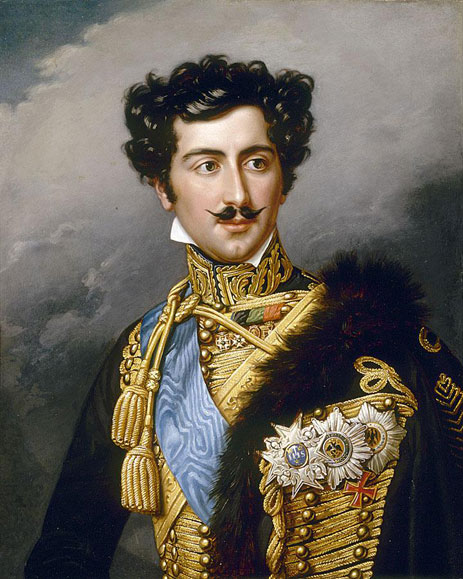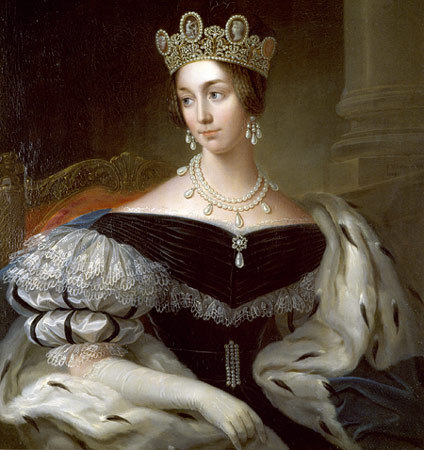by Susan Flantzer © Unofficial Royalty 2013

King Oscar I of Sweden and Norway; Credit – Wikipedia
King Oscar I was born Joseph François Oscar Bernadotte on July 4, 1799, at 291 Rue Cisalpine (today’s address: 32 Rue de Monceau) in Paris, France. His father was General Jean-Baptiste Bernadotte, a Marshal of France and the French Minister of War. His mother Bernardine Eugénie Désirée Clary, known as Désirée, was the first fiancée of Napoleon Bonaparte. Julie Clary, his mother’s sister, was married to Joseph Bonaparte, Napoleon’s brother, and Jean-Baptiste and Désirée’s son was named after Joseph Bonaparte. The name Oscar was suggested by Napoleon Bonaparte, the baby’s godfather. Napoleon was an admirer of the 18th-century Scottish poet James Macpherson and the name Oscar was used in Macpherson’s works.
In 1809, King Carl XIII of Sweden ascended the throne of Sweden. He had no living children, and his adopted son and heir died the following year. The Swedes had the idea to offer the position of Crown Prince to one of Napoleon’s Marshals. On August 21, 1810, the Swedish Riksdag of the Estates elected Oscar’s father Jean Baptiste Bernadotte as Crown Prince of Sweden. He arrived in Stockholm in November 1810 and was formally adopted by the King Carl III of Sweden, taking the name Carl Johan, and converting from Roman Catholicism to Lutheranism. The new Crown Prince of Sweden was actively involved in the events leading up to the Treaty of Kiel in 1814, in which Denmark was forced to cede Norway to Sweden. Unlike the previous union with Denmark, this was a personal union under a single sovereign, and Norway remained an independent state with its own constitution. King Carl XIII of Sweden also reigned as King Karl II of Norway. The separate kingdoms of Sweden and Norway were under a common monarch from 1814 until its dissolution in 1905.
Oscar was eleven years old when his father was elected Crown Prince of Sweden and in December 1810, he traveled to Stockholm with his mother Désirée. Oscar was given the title Duke of Södermanland, and, unlike his mother, quickly learned Swedish and adapted to life in Sweden. As Crown Princess, Désirée had difficulty adjusting to the Swedish court and despised the weather in Stockholm. She left Sweden in 1811 and did not return until 1823, five years after her husband became king. As a result, Oscar did not see his mother for twelve years.
Oscar’s father prescribed guidelines for his son’s education. Upon arriving in Sweden, Oscar was immediately schooled in Swedish, quickly became proficient, and served as his father’s translator. Besides Swedish, Oscar was also taught Norwegian and German. He studied humanities, administration, constitutional law, science, art, and music. Oscar was particularly talented in music and composed a funeral march performed at King Carl XIII’s funeral in 1818. When the composer Ludwig van Beethoven heard of this, he wrote to Oscar’s father and was invited to help develop Oscar’s musical talent. Besides his musical talent, Oscar was an expert in social-political issues and wrote articles on education and prison reform. He was elected an honorary member of the Royal Swedish Academy of Sciences and was appointed chancellor of Uppsala University.
Oscar married Princess Joséphine of Leuchtenberg (known by the Swedish form of her name Josefina) by proxy at the Leuchtenberg Palace in Munich, Kingdom of Bavaria on May 22, 1823, and in person at a wedding ceremony in Stockholm, Sweden on June 19, 1823. Princess Joséphine of Leuchtenberg’s father was Eugène de Beauharnais, the son of Empress Joséphine (who was Napoleon’s first wife) from her first marriage to Alexandre, Vicomte de Beauharnais who had been guillotined during the French Revolution. Her mother was Princess Augusta of Bavaria, a descendant of King Gustav I of Sweden and King Charles IX of Sweden, thereby ensuring that future members of the House of Bernadotte were descendants of the House of Vasa which ruled Sweden from 1523-1654. Joséphine brought to Sweden jewelry that belonged to her grandmother Empress Josephine. Members of the Swedish and Norwegian royal families still wear the jewelry. For instance, Empress Jospéhine’s Cameo Tiara was worn by her descendant Crown Princess Victoria of Sweden on her wedding day.

Queen Josefina wearing the Cameo Tiara; Credit – Wikipedia
Oscar and Josefina (as she was known in Sweden) had five children, four sons and one daughter.
- King Carl XV (Carl IV in Norway) (1826–1872), married Louise of the Netherlands, had issue
- Prince Gustaf, Duke of Uppland (1827–1852), unmarried, died from typhoid fever
- King Oscar II (1829–1907), married Sofia of Nassau, had issue
- Princess Eugenie (1830–1889), unmarried
- Prince August, Duke of Dalarna (1831–1873), married Therese of Saxe-Altenburg, no issue
Oscar and Josefina’s marriage was a happy one. They shared interests in music and art and had similar personalities. While he was crown prince, Oscar had an affair with a lady-in-waiting which produced a daughter. After his marriage, Oscar had another well-known affair with Emilie Högquist, a famous Swedish actress at the Royal Dramatic Theatre. Oscar had two sons with his mistress Emilie. In 1832, Queen Josefina wrote in her diary that a woman was expected to endure a husband’s extramarital affairs: “A woman should suffer in silence.” Josefina and her husband continued to appear together in public. Oscar discontinued his extramarital affairs when he became King of Sweden and Norway in 1844 upon the death of his father.
Oscar I’s health had never been strong and he began to suffer periods when he would fall silent in mid-sentence and then continue a minute later as if nothing had happened. By the early 1850s, these symptoms worsened and in 1852 he was forced to make a trip to the spa at Bad Kissingen in Bavaria in hopes of recovery. In the fall of 1852, he became ill with typhoid fever and it took a year for him to fully recover. He continued to have neurological symptoms and by 1857, it was suspected that Oscar had a brain tumor. By September 1857, Oscar was paralyzed and the doctors recommended that he be relieved of his duties. On September 25, 1857, Oscar’s eldest son Carl was declared Regent. After being bedridden for a long period, King Oscar I died at the Royal Palace in Stockholm on July 8, 1859, at the age of 60. An autopsy confirmed that he had a brain tumor. King Oscar I was buried in the Bernadotte Chapel at Riddarholmen Church in Stockholm.

Bernadotte Chapel at Riddarholmen Church; Photo Credit – Susan Flantzer
This article is the intellectual property of Unofficial Royalty and is NOT TO BE COPIED, EDITED, OR POSTED IN ANY FORM ON ANOTHER WEBSITE under any circumstances. It is permissible to use a link that directs to Unofficial Royalty.
Kingdom of Sweden Resources at Unofficial Royalty
